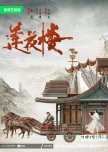
Catch me if you can!
Thirteen Years of Dust is the best Light On/Mist Theatre suspense thriller iQiyi has released since The Bad Kids and The Long Night in 2020. This tightly written mystery cum police procedural is gripping from the start. An eerily staged crime scene reminds Lu Xingzhi of a serial killer that had terrorised Nandu thirteen years ago, when he was just a rookie detective. Starting with his mentor Wei Zhengrong, he gets the old investigative team that had profiled and hunted the killer back together again. They have unfinished business to get down to. Thus begins a thrilling chase for the long hidden killer who seems to be taunting them, "Catch me if you can!"The way the narrative unfolds in parallel between the present and the past is mesmerising and immediately made me invested in the main characters, including potential antagonists. In the present, the characters are older yet wear unmistakeable vestiges of the past that make them seem still touchingly familiar. We see what they were like juxtaposed against what they have become. This invokes a haunting sense of nostalgia over what was lost and what could have been. This captures the essence of what made CBS's Cold Case one of my favorite police procedural series. Wei Zhengrong seems the most markedly affected. In sharp contrast to the rather rough, dismissive, and bitingly cynical cop in his prime, he becomes a muted, wiser and oddly broken shadow of his former self. Lu Xingzhi on the other hand has delivered on his early promise and come into his own but his family life is disrupted.
Chen Jianbin and Chen Xiao anchor the stellar cast in this production. Both are charismatic and convincing actors with such incredible chemistry that it evolves to reflect the passage of time. They each subtly take on some of the other's traits thirteen years later, indicating how deeply they influenced one another. It is not easy to play characters that have aged and changed over thirteen years, yet remain essentially that character. Beyond both leads, every main character in each of the many cases delivers riveting portrayals of both their younger and older selves. This brought the victims to life through the eyes of people who knew them, loved them, feared them, envied them and may very well have killed them! The side story that moved me most was that of the gangster and the dancer.
The plot is very well designed and is a lot more whodunit than howdunit. It is set in a time when use of forensic technology was nascent and primitive. So the cases had to be approached the good old fashioned way of narrowing down suspects to who had motive, means and opportunity. The evidence and clues are all presented in an even handed manner; there is no attempt to hide anything from the viewer. From early on, the audience has enough clues to credibly build a case around at least two suspects at any given time. While the solution is not a huge surprise as the killer is well concealed but far from invisible, it still comes with a decent twist. It is a surprisingly dark story with a chilling ending for a c-drama. The production maintains an unsettling tension of a disturbing and menacing presence throughout. If I have to criticise, the staged crime scenes are a bit pretentious and the explanation of the painting and its significance is on the weak side although it just passes muster.
Overall, this is a well written and nicely executed crime thriller that will satisfy exacting crime buffs. A highly recommended watch that I rate 8.5/10.0.
Cet avis était-il utile?

The enemy of my enemy is my friend.
This is the spy thriller that I will compare all other Republican period spy thrillers to going forward. It is that good. Each of the engrossing 61 episodes just flew by and I haven't been able to watch anything else since. I put this off for a long time due to poor reviews of the female lead's performance, which unfortunately is beyond dreadful. The rest of the cast however, is so phenomenal that they more than make up for it, to the point that the rating simply does not do justice to this drama.Set in 1940s Shanghai during the Wang Regime (Japanese puppet government), Chen Shen works for his best friend Bi Zhongliang who heads up the Special Operations Division. At surface, he is an indolent playboy, an aspiring barber until he was propelled into a position of favor and authority for saving Bi Zhongliang's life. In reality, he is a double agent loyal to the CPC. Things get complicated when his former student and true love Xu Bicheng and her husband Tang Shanhai are assigned to the Special Operations Division. The paranoid Bi Zhongliang eyes them with suspicion because Bicheng is his superior and rival Li Moqun's niece. He is already under growing pressure from both Li Moqun and their ultimate superiors, the Japanese for failing to capture the notorious communist spy Sparrow.
The overarching plot of this drama is rather simple and clean. The main communist and nationalist protagonists have just one mission; to steal the Return to Zero plan hidden within the Special Operations Division. The antagonists are aware of this and use this knowledge to try to trap them into revealing themselves and to capture Sparrow. The subplots and unpredictable way the storyline unravels with many twists along the way are largely driven by the characters as they react to stressful life and death situations that force perilous split second decisions. One of the weaknesses in storytelling is that the writers resort to coincidences and sheer luck a little bit too often to facilitate twists or bail the main protagonists out of tricky situations. Nonetheless it all comes together to deliver an intense aura of suspense that builds towards the thrill of unexpected victories, shocking betrayals, blindsiding plot twists and sudden death.
Chen Shen is the perfect spook - he is on the one hand an innocuous ladies man; a charming, stylish teetotaler who can't even bring himself to fire a gun. Yet he manipulates Bi Zhongliang masterfully; ruthlessly stoking and soothing his insecurities at the same time. This is by far the most fascinating relationship in the drama. Although he mistrusts Chen Shen, Bi Zhongliang is also touchingly sincere and protective of him. Chen Shen's feelings towards him are complex; they have an unusual bromance that pulls them together regardless of the fact they are on opposite sides. Chen Shen is not only the most intriguing character in the drama, he is also considerably more ruthless and manipulative than the main antagonists. This is by far Li Yifeng's most memorable role to date, well complemented by Zhang Luyi's disarming portrayal of Bi Zhongliang. The dialogue is sophisticated, pointed, witty and laced with sarcasm and dark humor that often relieves suspenseful tension with laugh out loud moments and encapsulates the complex character dynamics.
Even though I am a huge sucker for morally ambiguous characters like Chen Shen, there are almost too many moments where Zhang Ruoyan's Tang Shanhai eclipses him. And it is not just because he looks so incredibly scrumptious in a suit. Too often the second male lead is dumbed down to elevate the male lead. While it is true that Tang Shanhai is not quite the consummate spy that Chen Shen is, Zhang Ruoyun pulls this off without portraying Tang Shanhai as less intelligent; just a tad less ruthless, a tad less composed and a lot more heart. He is thrust into many parallel situations with Chen Shen but the way he processes and reacts to the situation, how he is clumsier at manipulation, how his remorse is more visible; makes it clear that he is a less hardened spy. His relationship with Chen Shen evolves from rivalry and distrust into mutual respect and a grudging friendship that compels the two to work together when their interests align. The enemy of my enemy is my friend is a recurring motivator in this drama that pits multiple characters alternately with and against each other.
The female lead, Xu Bicheng is by far the drama's weakest link. Unlike many, I don't think the writing is the problem; on the contrary I find the character to be one of the best written, most complex female roles out there. Bicheng is a flawed character; stubborn to the point of recklessness with a bleeding heart for lost causes who wears her heart on her sleeve. She is also often underestimated, can be very cunning, is a fantastic liar when cornered and is able to manipulate both Chen Shen, Tang Shanhai and Tao Dachun into doing what she wants and her character undergoes tremendous growth. None of these positive aspects are conveyed by the acting because Zhou Dongyu is a very limited actress who just lazily recycles the same four boring, mopey, terrified and pitiful expressions throughout the drama. The only things she does well is child ugly cry and child uninhibited smile from the heart. Which is wonderful... if she were playing a child. In this role, it is at odds with the role of a woman in her mid twenties, a spy and a married woman for crying out loud. It is also obvious no one ever told her it does not suit her naturally rather mature facial features and incredibly grown up styling in this drama. She fails so badly at projecting that je ne said quoi that has every man fall in love with her that its not even fitting to call her a Mary Sue even though she does need constant rescuing. I could not empathize with her at all and couldn't care less what happens to her.
Kan Qingzi was robbed - her Li Xiaonan stole the show and she really deserves top billing as female lead in this show. Her performance puts Zhou Dongyu's to shame even though the character is at surface, less complex and interesting. I normally loathe ditzy, lame characters like Li Xiaonan who are capable of loving wholeheartedly even when it is not reciprocated. But wow, she made me laugh, she made me cry, she made me respect her single-mindedness, I was 100 percent behind her. And that is what a good actor does, it is what every actor in this exceptional cast other than Zhou Dongyu managed to do - impress me with their acting and make me empathize with them even when they play dark or weak characters. Geez even Yin Zheng or especially Yin Zheng managed to make me empathize with his portrayal of the rabid, vicious, cruel and dangerous Su Sanxing.
A criticism of this drama is that love seems to have overshadowed the spy story; that the unrequited love trope is perhaps overused in this drama. While there is some truth to that, this is still very much a spy thriller that is chock full of excellent twists and turns. And the bigger point is that the unrequited love trope is used brilliantly to explore how each of the main characters bestows and responds to unrequited love in completely different ways. I normally approach Republican dramas with a stone cold heart - I go in pretty much expecting everyone to die it is just par for the course. In this one, too many characters still managed to steal my heart and made me bawl my eyes out. That said, the drama ends very fittingly after the final showdown.
My favorite line in the drama is Chen Shen's heartfelt "Please... don't tell anyone you were my student." This is by far the best Chinese spy thriller I have seen to date (August 2021). This is a 9.0 for me but I could easily rate it 9.5 were it not for the appalling execution of the female lead role.
Cet avis était-il utile?

在下晴明 - Qingming is in the house.
在下晴明Yes! Yes! YES!!!
Qingming is in the house!!!
That is THE most striking difference between Yin Yang Master and Dream of Eternity, where I was like - Huh?...what??? Detective Dee?? Where is Qingming??? Where oh where is my yin yang master? THE Yin Yang Master? And in this Chen Kun just delivers the wickedly enigmatic and alluring essence of Qingming, a diabolically powerful, magical, misunderstood half human half demon that walks the world in between.
This version of Yin Yang Master's plot is much simpler and thus, better executed. It hones in on the life and death bond between a demon familiar shi shen/侍神 and their master zhu ren/住人. Falsely accused, half human, half demon Qingming is estranged from his zhu ren Baini and the Yin Yang Bureau. They reunite in a desperate attempt to recover an artefact that can set a powerful demon free; a quest that tests and lays bare their true loyalties and exposes past betrayals. Chen Kun and Zhao Xun's chemistry never fails to thrill, captivate and move me and they effortlessly convince me of their life and death bond. What I also love is that Qingming is not just uselessly waving his hands in the air reciting incomprehensible incantations. He really jumps into the thick of the fray in a way that leaves no doubt that he is in it to win it. In every life endangering encounter there is that nail biting sense of urgency, intensity and imminent peril. This fantasy world with its human and demon yao/妖 inhabitants has a very adorable, young adult and enthrallingly magical feel to it. In many ways, it captures the essence of Disney in that it speaks to two audiences both kids and adults with its clear message that both humans and demons can be monsters.
The only thing I really did not enjoy in this movie were the second leads - both actors were juvenile and did not deserve the screen time that they got. The animated characters like the Evil Red Ghost and side characters like the Peach Blossom Fairy were far more compelling and managed to capture my heart over those two jokers.
Overall this was a very entertaining movie - Chen Kun fans like myself will obviously be able to find many things to like and I can see kids just absolutely loving it. I rate it 7.5.
Cet avis était-il utile?

Love Like the Galaxy : Partie 2
50 personnes ont trouvé cette critique utile
Birds of a feather.
The second part of Love Like the Galaxy 月升沧海 (The Moon Rises over the Ocean) is shades darker as Cheng Shaoshang struggles to open her heart and mind while Ling Buyi's secrets and inner demons are revealed. Their romance plays out in the bosom of the royal family, where Shaoshang blossoms under Empress Xuan's affection and tutelage. This subjects our golden couple to much envy and political intrigue.Shaoshang of Part 1 is disappointingly over empathetic and likeable. Shaoshang of Part 2 is immature and frustrating to the point of being dislikeable, This is exactly how she is meant to be depicted and the portrayal I was waiting for. So I must applaud Zhao Lusi for so daringly rendering Shaoshang as a difficult, often petty, unforgiving, vengeful child woman who wallows most unbecomingly in self pity. As an unloved child, Shaoshang is terrified of love. While she tries to figure out what she wants in a partner, she puts up all kinds of walls and clings to any excuse to not allow Ling Buyi in. She is her own worst enemy, fighting happiness every step of the way. Ling Buyi's infinite patience and indulgence of her is so hot anyone else would have succumbed to raging hormones in short order. Not Shaoshang though. She knows her worth and digs in her heels to demand to be an equal partner in every sense and meaning of that term. While highly usual for a woman of that time, it resonates with modern audiences for obvious reasons.
There aren't really good villains in this drama. That is because Ling Buyi is such a chilling character that he is already as close to a villain as can be. He is a man with a secret, one whose entire raison détre is to uncover the master mind behind the Gu City massacre and to avenge the Huo clan. He did not expect to fall for anyone and certainly not Shaoshang. He meant it when he said they were on different paths. On many occasions he merely eases her way with the intent of letting her go but never quite succeeds. He loves her selflessly and indulges her worst instincts, especially her vengefulness. Hence Yuan Shen's blinding epiphany that Buyi and Shaoshang are birds of a feather. They are rebellious and vengeful eye for an eye kind of people who can't tell the difference between a chicken and a duck. They are also at surface cold, unforgiving even selfish but in truth feel deeply. I find Wu Lei's acting in Part 2 more natural and compelling. He is such a patient, warm and tender person but only for Shaoshang. This is utterly different from the cold-hearted, calculating general who is a borderline psychopathic killer to his enemies. Wu Lei's combat scenes are simply the best. The aesthetic camera angles and gorgeous choreography brilliantly captures his stunning athleticism and graphic, muscular, ferocity that is capable of mowing down an entire battalion.
For me, Empress Xuan is the true hero of this story. As much as I enjoyed Buyi and Shaoshang's journey, it is her story and that of Wen-di and Consort Yue that I find so much more complex and moving. Told with epigrammatic dark humor that dulls the edges of their pain and sacrifice, they are nonetheless imprisoned by values that are bigger than themselves. While Consort Yue lashes out with wit and acerbity, Empress Xuan suffers in dignified silence. Do not be angry with Shaoshang for finding it so difficult to forgive Buyi. Although his cause is just and the outcome serves the greater good, it cost Empress Xuan everything. Shaoshang's first unselfish, grown up act is to accompany her, to atone for what Buyi did and for how she unknowingly helped him. That is what devastates her as much as Buyi reneging on his promise to her. Buyi knows and understands this. Without Empress Xuan's forgiveness and generosity of spirit, they may not have found a way to forgive themselves and each other. Her love is truly like the galaxy in its vastness and selflessness. The galaxy owes it to her to make sure she and Wen-di do not meet again.
In terms of storytelling, very much like Part 1, Part 2 wastes too much time on too many delusional love sick women who conspire against the lovers. This comes at the cost of the storytelling. which towards the end suffers from heavy cuts and sloppy editing. As a result, characters like Lou Ben and Tian Shuo are not properly fleshed out and I did not feel that invested in either the Peng Kun or Guo Village arcs, which feel rushed. When they could have simply omitted both the Fifth Princess and Luo Ji Tong's arcs which were superfluous to the plot. It also underscores how nasty, dumb and divorced from reality the vast majority of the women in this drama are. I really do not like this type of misogynistic and cynical depiction of womenkind. Even though the ending is very satisfying, especially when it comes to the character stories, the unfolding of the plot which we waited way too long for is not well done. Considering the stunning production values, it is a shame if they do not go back and re-edit it with some of the cut footage into a Director's Cut.
All things considered, I enjoyed this beautifully written drama immensely. I find Part 2 slightly better than Part 1 and am pleased to rate the drama in its entirety and Part 2 on a standalone basis a 9.0, better than my 8.5 rating for Part 1 by itself.
Cet avis était-il utile?

This is like a fine dining experience - to be savored and remembered. It deserves an 11/10.
Nirvana in Fire is an exceptional drama by any and all standards - nothing else I have watched comes even close to surpassing it. It truly checks all of the boxes in terms of a complex plot, an incredibly talented cast, excellent screenplay, well executed action scenes and overall movie-like visual impact and production quality.This is the story of Lin Shu's single minded quest for justice and reform. His father, a powerful general in command of the 70,000 strong Chiyan army is framed as a traitor while away defending the Liang state. Victorious but battle worn, he is slaughtered along with his entire army before they have a chance to return to the capital. Young Lin Shu barely survives and re-emerges 12 years later as Mei Changsu, the mysterious leader of the powerful pugilist Jiangzuo Alliance. His appearance is completely altered and he is a sickly, shadow of the vigorous young warrior he used to be. He returns to the capital amidst a power struggle between the crown prince and his brother Prince Yu as the Divine Talent, a brilliant strategist regarded as an emperor maker. He plays them against each other and is on surface allied with Prince Yu while he surreptitiously advances the out of favor Prince Jing. The complexity in the plot arises in the brilliant and occasionally cruel strategies he employs to uncover the full extent of the conspiracy and all those complicit in his family's murder as well as to advance Prince Jing's position. This is not a story about revenge, it is about justice. It is also about reform as justice is worthless without reform. Making abiding changes to the court and the system that would be overseen by a just and moral ruler was an equally important outcome to Lin Shu/Mei Changsu. To achieve his mission, he had to do many things he considered despicable. Cleaning out the corruption in the court was the only thing he could do to make the senseless massacre of his family and comrades in arms mean something.
This is an impossible show to binge watch - I can at best get through two episodes in one sitting. We learn from the get go that Lin Shu is living on borrowed time. That imbues the drama with an omnipresent sense of sorrow and inevitability that grows as it steadily progresses towards the end. Whenever the mood gets unbearably heavy, there are welcome moments of brilliantly timed comic relief. The first episode is probably the most difficult to follow as most of the key characters are introduced all at once .Thankfully there are many excellent character guides online that are super helpful in the beginning. There are no unnecessary characters in this show; each one was brilliantly cast and has an important role in the unfolding storyline.
The role of Lin Shu/Mei Changsu is a complex one and not at all easy to play. This was without a doubt Hu Ge's defining role and he just killed it. Time and again he was able to subtly convey a multitude of intense emotions behind a superficially stoic expression. As Mei Changsu the strategist, he was brilliant, ruthless, calculating, Machiavelli and breathtakingly cruel when necessary while battling his self-loathing for the person he was forced to become. He is filled with longing, regret and fear of discovery as he re-encounters his former love, friends and relatives under this new identity. He masterfully portrays a callous indifference that masks unbearable hurt as his actions and morals are misunderstood by his best loved friend. As they inevitably begin to recognize his old mannerisms and think the unthinkable, he cannot help but tease them with the truth before skillfully evading their suspicions. The chemistry between Lin Shu/Mei Changsu and the rest of the cast and in particular Prince Jing (Wang Kai) is mesmerizing. Twelve years later Prince Jing still misses Lin Shu, his boyhood friend and cousin and was never quite convinced the Lin family could be guilty of treason. Despite his contempt for Mei Changsu's lack of moral scruple, the principled Prince Jing's soul knows him and he is eventually drawn into a strong and touching bromance with him . Equally moving were the rare smiles, flashes of humor and fatherly affection that emerges when Lin Shu/Mei Changsu teases Fei Liu, his lethally skilled and fiercely loyal boy protector. Despite his crushing physical weakness, he desperately lies to shield his loved ones from the extent of his suffering and true condition. I found myself grieving for not only the lost friendships and love affair that could have been but for the Lin Shu that Mei Changsu can never become again.
The character development in this drama is so sophisticated and multi-layered that even the worst villains of the piece are to evoke a sense of pity for their human failings and have some redeeming aspects. The story builds towards an epic climax that sees Lin Shu/Mei Changsu confront the person ultimately responsible for this terrible and unforgiveable betrayal. Both actors in this final showdown were phenomenal but I think the tyrant's rant from rage,to hubris, to denial, to defeat , to defiance and then finally to almost but not quite remorse truly blew me away. It is in this encounter that Lin Shu delivers his most excoriating, most tragic and and most damning indictment -"If you knew your son you would never believe he could betray you. If your son knew you, he would not have refused to believe you betrayed him." The script writing is powerful and we are treated to many emotionallly loaded lines but for me, this one was the one that summed up the root of the tragedy and made me weep for both of them. But Lin Shu/Mei Changsu was beyond tears. It is this ability to convey bottomless sorrow without shedding a tear that made this Hu Ge's unparalleled performance.
{Warning - Spoiler ahead]
I love it that this show pretty much ends after the climatic peak with most of the loose ends tied up well ahead. Even though we know from the very beginning that Lin Shu/Mei Changsu dies, it still broke my heart. Nonetheless, the drama comes to a very fitting and satisfying end. While this was an enthralling, immersive journey from start to finish, I think I need to take a break with something less intense. I suspect this will remain the very best drama I have ever seen for a long time although I still love Ten Miles of Peach Blossoms best.
Cet avis était-il utile?

The Story of Ming Lan
22 personnes ont trouvé cette critique utile
A cacophony of crows.
The Story of Minglan is a leisurely and meandering account of how with patience and cunning, Sheng Minglan, the low born daughter of a concubine triumphs over many challenges to achieve both personal and social success. Minglan's father is a middling court official who over indulges his favorite concubine and allows her to turn his household upside down. The petty tyranny of harem rivalry leads to tragedy and Minglan ends up being raised under her grandmother's wing. Minglan's great misfortune has a giant silver lining because this formidable old lady is a force to be reckoned with. She sees to it that Minglan is well schooled and helps her navigate the many pitfalls of harem politics. Minglan blossoms into a quietly underestimated young lady who catches the eye of the most eligible bachelors despite her low status.This drama digs deep into what lurks beneath the genteel façade of Confucian propriety among the status conscious Song dynasty nobility. The deceptively sedate, mundane, humdrum of women living lives of quiet desperation, occasionally broken by shrill outbursts that crescendo horrifyingly in a cacophony of crows. My eardrums barely survived the assault of this panoply of nasty, caterwauling women. The early arcs on Minglan's childhood and coming of age are the best, most empowering ones. The drama climaxes at her vengeance arc, where I found her quiet scheming and utter ruthlessness chilling and impressive. After that the domestic bliss arcs drag on far too long with the couple dealing with repetitive villains with all too similar modus operandi. We really did not need to see version 2.0, 3.0 etc of essentially the same not very smart wicked women archetypes that are too handily dealt with by our power couple.
Zhao Liying delivers a credible portrayal of a docile, Song dynasty noblewoman with hidden depths. The way she digs into you with her eyes, the fleeting cunning smirk and brief flash of fury in her placid gaze foreshadows her evolution into a full-on temper tantrum throwing wife! That said, Zhao Liying is still best at fierce roles rather than as a docile still waters run deep kind of character. Zhao Liying and Feng Shaofeng paint the perfect picture of domestic bliss.Their chemistry is that of a long married couple in harmony and less of the sizzling kind that flared up between her and Lin Gengxin in Princess Agents. It is rare to see Zhu Yilong in a costume drama and I felt real sorry for his Qi Heng who unlike both Gu Tengye and Sheng Minglan, has no free will as he is unable to free himself from the social strictures of his time. The cast overall is very strong with many veteran actors that deliver comical parodies of the ridiculous pretensions of the Song aristocracy.
I am afraid I did not enjoy this very well made drama as much as many other people did. The 70+ episode narrative goes on for too long, conveying an unnecessarily realistic impression of how suffocating it was to be a Song dynasty woman. Considering Gu Tingye's incredibly modern attitudes with respect to polygamy and empowering his wife, I am convinced it was impossible to be a Sheng Minglan in those times. Some of the early arcs are worth 8.5 but the story climaxes too early and is bogged down by repetitive plots in the latter half. This weighs my overall rating down to 8.0. This is a drama that patient viewers with robust eardrums will enjoy more.
Cet avis était-il utile?

The Advisors Alliance
22 personnes ont trouvé cette critique utile
The king maker is king of kings.
Note: There are some statements of well known. historical facts in this review. They are by definition not spoilers but be warned in case you are unfamiliar with the history of this period.Sima Yi, courtesy name Zhongda. History's most cunning grifter, a man who stole a throne and an empire more than once! I always enjoy dramas like this because they bring larger than life historical characters to life and deflate them into close to normal human beings. I never imagined Sima Yi would be portrayed as such a timid, groveling, deceptively harmless and well, just ordinary fellow. Or that he would be so terrified of his wife. That just cracked me up. Audacious.... sacrilegious even.... love it!
The drama opens with Zhongda, a brilliant scholar and tactician, welcoming his firstborn son Sima Shi into the world. His father Sima Fang is a shrewd and influential minister of the Han Imperial Court. By then, warlord Cao Cao had already openly seized power and repeatedly bullies the Han Emperor into a sniveling, terrified puppet. Zhongda unwittingly catches the eye of Cao Cao as he deftly extricates his father from a dire situation. He goes to extreme lengths to avoid serving Cao Cao who is both keen to make use of his talent and wary of it at the same time. Recognizing his innate cunning and ambition, Cao Cao regards him suspiciously as a double edged sword and comes close to killing him dead many times.
Initially I was surprised and a little bit underwhelmed to see such a timid and groveling Sima Yi. But the layers peel away very satisfactorily to reveal his hidden ruthless nature, his scheming and bold ambition. He is a king maker, someone capable of securing the throne for Cao Pi, the less favored son against Cao Cao's own wishes. He then proceeds to steal an empire for Cao Pi but this part seems whitewashed. I doubt Liu Xie was really that eager to so simply hand over the throne. Not surprisingly, he also intervenes in Cao Pi's succession plans. At that point, it is clear that Sima Yi the king maker is king of kings; that three generations of Cao rulers' succession is determined by this man. Notwithstanding his many contributions, Sima Yi is portrayed as a selfish and cunning character who parleys his own interests ruthlessly. He manipulates two revered ministers into sacrificing themselves to ensure Cao Pi's ascension, but it is clear his primary motive is to save his brother's life.
Sima Yi's great rivalry with Yang Xiu is rivetingly played out in the bitter succession battle between Cao Pi the worthy son and Cao Zhi the favored son. Both are ambitious and brilliant tacticians but they couldn't be more different in nature. Yang Xiu is arrogant, outspoken and extremely intuitive. He cannot help showing off, often over estimating himself and underestimating his enemies. This cost him his life and Cao Zhi the throne his father so badly wanted to give him. In sharp contrast, Sima Yi avoids attention and while he is is often underestimated, he has a healthy respect for his enemies capabilities. His final conversation with Yang Xiu, someone he empathized with, respected and learned from as a worthy opponent illuminates how Sima Yi managed to hang on to his head through many dangers. I have not watched Wu Xiubo before and I was hesitant about him as he is not the image that jumps to mind when I imagine Sima Yi. My concerns faded almost immediately and I cannot think of a better actor to play the role of Sima Yi as characterised by this production.
This drama largely sticks to history in terms of the key events and leading characters of the day. Told chronologically, the drama unavoidably peaks with the exit of the veteran actors who also play the most interesting figures of the day. This drama's highlight for me was Xun Yu's (played by none other than the fabulous Wang Jin Song) opposition to Cao Cao's decision to form his own feudal state. Their bittersweet final exchange that touched upon their long friendship, mutual respect and alignment that turned into reproach and disappointment is a powerful, memorable and compellingly acted drama moment that only two actors of such caliber can deliver. I can recommend watching this drama for that scene alone. I feel pity for anyone attempting the role of Cao Cao after Yu Hewei. I almost wept with joy at the perfection of his rendering of Cao Cao in his twilight years; the ambitious warlord stymied by the limits of his own mortality and torn by his succession dilemma between his most worthy son and his most loved son. Needless to say he is as bad a dad as he was as good a warlord and statesman. Ironically, Cao Cao sows the seeds of the downfall of his own empire as Cao Pi is also a terrible father who also messes up his own heir. Whereas the Sima family in sharp contrast are paragons of Confucian family virtue, the foundation of a moral society.
When it comes to the inner palace and familial relationships, the storytelling embellishes wild history and heavily fictionalizes the historically insignificant aspects. I was sad but unsurprised to see Cao Pi's deep friendship with Zhongda become distrustful and utilitarian after he becomes emperor. While I understand the audience appeal, it is well known that Zhongda's relationship with his wife was much less cordial but I love Liu Tao and was happy to buy into this Disney version. However the whole song and dance with Lady Bai and how Zhongda was "forced" to accept her went too far and just made me roll my eyes. I expect a man of that status in those times to have concubines I don't see the need to waste so much time suggesting he meant to be monogamous when he definitely was not. I also was not compelled by the chemistry between Cao Pi and Lady Guo but at least they didn't try to suggest he didn't have a harem. Lady Zhen's story could well just be speculative history but she is the character I felt the most sorry for in this drama.
The Advisors Alliance is the first instalment of Sima Yi's story and ends with Sima Yi retiring from active duty under Cao Pi. By then, Sima Yi and his proteges had succeeded in pushing through agricultural and structural reforms that made Cao Wei great and restrained the power of the Cao clan warlords. It is a fascinating account of how an understated and often under estimated Sima Yi was ruler in deed if not in name. His machinations paved the way for the Sima clan's rise in influence which eventually led to the founding of the Jin dynasty, which many still argue was not a legitimate state. I enjoyed this enough to rate it an 8.5 and will probably go on to watch the second season Growling Tiger, Roaring Dragon which focuses on his rivalry with Zhuge Liang.
Cet avis était-il utile?

Demon in red.
Zhao Yao is a fun fantasy love xanxia drama where both leads belong to the dark or demon sect. The unconventional "good vs evil" plot challenges the idea of what is "good" and what is "evil" as the good guys are really the bad guys in this drama. The best thing about this drama is the sizzling chemistry between the two leads. What totally really drags it down is that it is littered with fillers - it should at best a 30-40 episode drama. That made me grumpy and is the main reason for the less high rating.Zhaoyao (Bai Lu) the female lead is an unapologetic bad-ass she devil who falls for the Demon King's son Moqing/Li Chenlan (Xu Kai). Li Chenlan is imprisoned by his father until he can free him from the powerful evil demon force within him. Zhaoyao is raised in solitude by her grandfather; it is their sacred duty to guard Chenlan until the Demon King returns. Led by the powerful immortal Luo Mingxuan, the righteous sects decide to preemptively kill Chenlan before he can wreak devastation on the world. Instead, they accidentally free Chenlan and an injured Mingxuan is rescued by Zhaoyao, who becomes infatuated by his chivalry and righteousness. She is outraged when she discovers his plans to kill Chenlan and boldly rescues him, earning his undying love in the process. She is captured and tortured by the thwarted Mingxuan and her freedom comes at a devastating personal price. Enraged and disillusioned, Zhaoyao forms and builds up her own formidable Wanlu Sect that wreaks havoc on Mingxuan and his "righteous" sects and protects those persecuted by them.
While recovering a legendary sword, Chenlan accidentally releases a deadly force that kills Zhaoyao. Boy is she pissed!!! She returns as an angry, vengeful but much weakened spirit that is hell bent on killing Chenlan dead. By then, Chenlan is practically invincible and it further incenses her to discover he has taken over as the leader of the Wanlu sect. This man enjoys living dangerously - he is so besotted with Zhaoyao that he is amused by and even welcomes her efforts to alternately kill and/or seduce him. The best moments are all centered around their occasionally funny and wholly adorable interactions. He is totally putty in her hands and cannot deny even her most dangerous requests. The sparks literally fly between them and their body language and obvious affection for each other is mesmerizing. All the early to middle episodes of them falling in love were the best and totally re-watchable. Bai Lu's Zhaoyao is just simply phenomenal - she is fiery, fearless, impetuous, occasionally wicked and completely bewitching. She also really brings out the best in all of her co-stars. However, outside of Bai Lu and Xu Kai, the cast is rather dull and didn't to engage me. Two of the other main female characters have a tendency to wail, which always has me scrambling for the fast forward/mute button. Sigh! When will they get it that wailing, whiny and noisy female characters are a nuisance?
The second female lead in this drama plays Qin Zhiyan (Yan Xiao), whose body Zhaoyao shares in the first half of the show while she tries to reclaim her own. The two are polar opposites yet form a strong and cute friendship. I wasn't wowed by Yan Xiao's overall performance, she got too much airtime in the first 20+ episodes that her cuteness turned into boring/whiny. The editing is sloppy - it jumps ahead, flashes back and in some cases explains what happens much later. I would rewind thinking I missed something that gets explained much later on - like how Mingxuan was out of the blue in a sealed state by Zhaoyao. I have FOMO so I hate fast forwarding but there were too many flashbacks and boring conversations between the righteous sects. Both the female and male love rivals were total cliches - they each sought to win Chenlan/Zhaoyao's love by killing off their rival. Wow -such a time tested losing and deranged strategy. The other main antagonist Jiangwu was an immature and swaggering pest until he redeemed himself slightly at the end. There are also a bunch of forgettable side love stories. The pace overall is painfully slow.
This drama went downhill toward the end. It didn't help that they randomly (and unnecessarily) killed off secondary characters. The ending was a bit rushed, garbled, messily executed and a bit wishy-washy when it could have and should have finished very strong. What is truly baffling is the countless wasted filler moments that could have been cut so that the ending could have been done properly.
I still recommend this but wouldn't bother to watch the whole thing. It wouldn't be a bad idea to drop it after Zhaoyao and Chenlan get together somewhere in the early 40s. Fast forward with impunity every time one of the two excellent main leads is not on. I will be looking out for more dramas with them (together would be great) and especially Bai Lu.
Cet avis était-il utile?

When karma slaps back.
Blossom (九重紫) stands out in a year where too many highly anticipated period costume dramas implode and self destruct pass the mid-point. This is short drama director Zheng Jingjie's debut long form drama where he once again compels with his brand of immersive storytelling. This drama avoids naming the dynasty as the narrative takes liberties with history and is quite critical of the emperor but it should be loosely set in mid-Ming dynasty, during the reign of the Chenghua emperor. The rebirth premise is straightforward and the business and palace conspiracy plot arcs while often done, are transformed by innovative takes on tired themes, a masterful build up in tension, suspense and relief and brisk pacing overall. There is nothing really that special about the plot or the acting, it is once again mostly about this director's captivating camera language and narrative panache that turned multiple low budget short dramas into memorable mini hits that punch above their production values. His foray into long form dramas should hopefully shake up the complacent and lazy storytelling characteristic of the well established long form directors.Dou Zhao is the capable, long suffering wife of Wei Tingyu, the profligate Marquis of Jining. She chooses the cold and snowy night that vengeful butcher general Song Mo helps Prince Qing depose the crown prince and seize the throne, to dump her husband's sloppy ass. As she flees the capital, she is rescued by an injured Song Mo and they take refuge at the temple of a mysterious monk Yuantong. Cornered and betrayed, they fall into an abyss through time and space, inextricably bound through Yuantong's cryptic book of divination. Dou Zhao wakes up as if from a dream, as a young girl again, clutching the prophetic book like a lifeline. She is immediately thrust into one of the turning points in her life, where she painfully learns that forewarned is not necessarily forearmed. Nonetheless, she determinedly sets out to get it right this time around; to make herself financially independent and to avoid her past disastrous marriage. One of the story's strengths is that when karma slaps back, jeopardy is at play and Dou Zhao's book of riddles is far from a roadmap of the future. As the ripple effects of the changes she makes snowball, her world increasingly deviates from the past and the path ahead is murky and no less treacherous.
As for Song Mo, he has the hero halo and is the total package as far as physical appearances go but that is about it. As it turns out, his impressive muscles extend all the way up between his ears. This is an all bravado, all heart, kind of character that allows his rage and impulses to dictate his actions. As Ji Yong mockingly points out over and over again, he is a mantis with little insight or awareness even of who is moving the chess pieces around him and is easily manipulated into being someone else's pawn. His reckless, selfish and misguided quest for justice for one person, puts the wrong person on the throne and upsets the order of the universe, resulting in injustice for many people. So much so that 閻王/Yanwang the King of Hell himself must have rejected him and sent him back for a reboot. He does not get smarter, he is simply Dou Zhao's pawn the second time around and not the chess player. She is the inner voice of caution he does not possess that saves him time and again from his worst instincts. Dou Zhao's mature styling gives her gravitas as a business woman but it also makes her look visibly older than Song Mo. Leaving a few grey streaks in his hair may have negated this impression somewhat. Needless to say, even though I enjoyed the plot, I am lukewarm about this kind of CP and was not bowled over by their romance or chemistry. In fact, I find Dou Zhao has better chemistry with Ji Yong, who is her intellectual equal and her soul mate and confidante. But yeah, I get it, I'd probably also pick the hot general over the chess grandmaster. Being shallow is so much more fun!
The cast in this drama are all up and coming actors whose acting skills are still works in progress. Nonetheless, this director is accustomed to working with C-grade actors and adroitly papers over all their flaws with his brilliant visual narrative style. The best decision this production made was to invest in good voice actors that were able to give definition to all the roles that mattered. This is a case study for how in some cases, it is better not to rely on original voice. While I always like the storytelling approach of making certain supporting roles main characters of their own arcs, this was hit or miss in terms of execution. I enjoyed Wei Tingyu and Dou Ming's sub-plot best, but both characters did not get an ending they deserved. This was so that a tropey villain like Wei Xingyue got her own super unoriginal and overly melodramatic arc. It was a race to the bottom with the completely ridiculous and boring Song Han and Miao Ansu arc, which highlights the two most atrociously bad actors in the cast. There are more interesting character stories played by more charismatic actors including Chen Jia and Zhao Zhangru, Gu Yu and Wu Shan that they could be better explored. I really enjoyed Gu Yu and hope to see more of this very humorous and charming young actor Fu Weilun. Unlike Dou Zhao who has Ji Yong, Song Mo doesn't have a really good sidekick and Gu Yu could have been better utilised in this capacity. While there is no shortage of petty and not so original villain archetypes, this story lacks a really good villain with a compelling motive. The only ones that had real mastermind potential got whitewashed in the finale to deliver one twist too many.
Despite a few arcs that could have been better, a few missed opportunities, some sloppy logic and messy edits, the story finishes strongly at the plot climax and ends in a satisfying way. It is a very solid production that made the best of its limited resources. It got noticed and won well deserved praises not only because it is truly quite good but because so many other dramas with superior resources ended up bombing out so badly in 2024. As someone who was long ago bored with the romance genre, I enjoyed this enough to rate it 8.5/10.0
Cet avis était-il utile?

Mysterious Lotus Casebook
45 personnes ont trouvé cette critique utile
Ask me no questions, and I'll tell you no lies.
Mysterious Lotus Casebook is a dark 江湖/jiānghú story about the ultimately futile aspirations and obsessions of the martial world. In an epic battle for supremacy, Di Feisheng of the dark Jinyuan Alliance challenges Li Xiangyi, the leader of the righteous Sigu sect. Both men disappear from the martial world afterwards, leaving a vacuum at the top and their sects in disarray.Ten years later, aspiring young detective Fang Duobing comes across Li Lianhua, a famous itinerant doctor whom he is convinced is a quack. Determined to expose him, he attaches himself to Li Lianhua as inextricably as a wad of chewing gum in his hair. They run into Di Feisheng, who immediately recognises in him his old nemesis Li Xiangyi. The two old rivals remorselessly keep Fang Duobing in the dark as they try to figure out who sabotaged their fight and search for Li Xiangyi's deceased sect brother Shan Gudao's corpse. An unlikely friendship develops as they work together to solve a series of strangely connected jiānghú cases.
Plot wise, this drama is solid but dry and unremarkable. The cases all unfold at a fast pace and are easy to follow, but do not engage audience participation. They are simply plants for clues to a treasure hunt for artefacts that unlock the main conspiracy. Despite a hint of the supernatural, the cases fall short of chilling or suspenseful. The hidden mastermind behind the main conspiracy is pretty obvious and revealed fairly early on, and even the ironic twist at the end is not much of a surprise. Both villains are one-dimensional jiānghú archetypes driven by vanity and delusions of grandeur. Wang Herun's scarily convincing portrayal of the Saintess of the insane cackle elevated the role beyond its one-dimensional character blueprint.
\What makes this drama a success are fascinating main character designs, strong rapport among the three leads, the scintillating dialogues, and well-choreographed and exciting action sequences. The real mystery is about who Li Xiangyi was and why he was killed. The answers are at surface trivial. Li Xiangyi was perched at the top of the martial arts world as the world's best swordsman and leader of the righteous sects. This made him the envy and natural target of virtually everyone. However, Li Xiangyi was far from the perfect hero of Fang Doubing's idealistic imagination. In fact, he was a self-absorbed, pompous ass who believed the universe revolved around him and his worldview. His swordsmanship is matched by a brilliant, cynical mind and a razor-sharp tongue that, according to poor Ai'man, can slay a person with a few words. If there is one thing lacking in Cheng Yi's otherwise stellar performance, it is that his Xiangyi is too empathetic. This masks his many flaws and hides how insufferable and difficult he was as a person. It took me awhile to realise that his sect had some inkling who Li Lianhua really was but they refused to recognise him because they just did not want Li Xiangyi to come back.
As for Li Lianhua, he is just a shard, a detached, sickly, disillusioned and world-weary remnant of the glorious Li Xiangyi. Cheng Yi really compels with his heart rending expression of this facet of the character singing his swan song without a shred of self pity. I lived for the sudden bursts of energy or sheer willpower that momentarily revives the breathtaking, dazzling and dizzying swordsmanship that propelled Li Xiangyi to dominate wuling. Only to all too rapidly diminish back into Li Lianhua again, a wickedly unapolagetic compulsive liar whose mantra is clearly, "Ask me no questions, and I'll tell you no lies." This is how he keeps everyone, and especially the hapless Fang Doubing, at arm's length; to avoid new personal entanglements. Fang Doubing (which literally means "sickly") is a parody character, the typical naive, high-minded, young adventurer raring to make a difference in the martial world. The dialogue is well written and humorously illustrates how grudgingly Li Lianhua is moved by this pesty young detective and tacitly accepts him as his successor. However, this kind of clichéd relationship dynamic of the clueless sidekick that elevates the brilliant sleuth is too common and quickly becomes boring. Li Lianhua's lies to Fang Doubing went on for too long to the point it became cruel and unnecessary. Their relationship is over explored and shortchanges the more interesting relationship in the drama.
What disappoints me most is that the writers opted to very cursorily explore the more complex and interesting relationship between Di Feisheng and Li Lianhua. Di Feisheng is the most layered villain in this story; that rare antagonist who transforms into a protagonist. Like Li Xiangyi, he rises to the top of his sect through sheer martial prowess rather than by winning hearts and minds. They are enemies who become friends, both betrayed and searching for answers. But his story is sidelined for much of the drama, his backstory is rushed, and his relationship with Li Lianhua does not really get a chance to develop and grow. Yet the best moments of this drama, are when all three of them are together, like a found family.
I like that this ends with an action-packed finale and satisfying final confrontations with the antagonists. But as for the plot, the best reveal is when Fang Doubing figures out who Li Lianhua is, which isn't really a revelation to the viewer. And I can't really pinpoint when the plot reaches its climax, as none of the high points make a strong impression. As for the ending, it is fitting but not as definitive as I would have liked. Most of Li Lianhua's journey is about putting his affairs in order and offering closure to those he cared for; to help them move on from Li Xiangyi who in all the ways that mattered died ten years ago. Yet Li Lianhua continues to string poor Fang Doubing (and us) along, which is too cruel and inconsistent with the drama's core message about letting go of past attachments and moving on. These kinds of endings that try to please all audiences really annoy me. I still enjoyed this superbly well written drama, immensely even though I think it had the potential to be much better. For me, this is an excellent 8.5/10.0 and a highly recommended watch.
Cet avis était-il utile?

Soul searching.
This is an absorbing sci-fi suspense thriller built around themes relating to the immortality of the soul and its ability to reincarnate after death. The city's top prosecutor Liang Wen Chao (Chang Chen) takes on a high profile, inexplicable and grisly murder of a terminally ill tycoon. As Wen Chao examines the key suspects - the son, the young wife, the deceased ex-wife and the business partner, cutting edge technology and superstitious rituals intersect to further muddy waters already tainted by greed, love, hate, misplaced loyalty, revenge and man's futile quest for immortality.Without spoiling it, I think the whodunit aspect of it is quite well done from the way the suspicion shifts from one suspect to another until the impossible is eliminated down to what remains as the improbable truth. I did not completely buy into some of the motives of the key suspects and I was irritated by the over-acted supernatural twist that failed to deliver the chiller thriller effect it was striving for. As for the howdunit aspect I will just say it was much more fiction than science but this is the case with most sci-fi thrillers. Since it does deliver an interesting twist, it is very forgivable so just go along with it and suspend disbelief.
This movie's strongest selling point is Chang Chen and Janine Chang's performance as the core investigative team and lead couple. The kind of stoic, desperate soldiering on Chang Chen does as a terminally ill man desperate to do his best for A Bao and their unborn child with what little time he has left is heartbreaking and moving. This is really Chang Chen's best role in terms of how he conveys such deep emotions and soul searching with so few words and how his journey gives him unique insight into the victim. Beyond his incredible weight loss, I was also riveted by how effectively Chang Chen conveyed the impression of a man calling upon the last legs of his energy, whose mind is very much alive as his body fails. This is not a love story but because of amazing acting by the lead couple, I can see the depth and complexity of their unspoken emotions, how well they just fit together, understand and sacrifice for each other. This is the part of the movie that will stay with me.
Cet avis était-il utile?

La Légende de Zhuohua
54 personnes ont trouvé cette critique utile
Women should not rule the world.
The Legend of Zhuohua is another in a string of recent female empowerment themed historical romantic dramas. The production is upfront that this drama is a work of pure fiction. It is impossible for women to exercise the kind of influence and authority portrayed in this story in ancient Chinese patriachical society. The attitudes and values articulated are also incredibly modern and unsurprisingly, resonate with current audiences. It should be enjoyed at face value accepting that many aspects of it are sheer fantasy.Titular character Ma Zhuohua flees an arranged marriage to the capital; where she must pass the imperial exams to fulfill her ambition to be a female official. Quick witted and resourceful, she saves Lord Ding, a decorated war hero, when he is wouded in the middle of a clandestine operation. Their fates intertwine as he is the strongest advocate of opening up scholarship and official positions to women. As they collaborate on official assignments and work toward their shared vision of the country, they fall in love. Can their relationship navigate a feudal system that requires women officials to choose between marriage and their career?
The most enjoyable arcs of this drama are the early courtship ones. This is the first time I have enjoyed Jing Tian's playing such a clever, demurely mischevious and independent character. Despite a ghastly white color filter and not the best dubbing, the strong chemistry between Jing Tian and Feng Shaofeng is unmistakable. It is so refreshing and very hot to see such a candid, lively and purely adult relationship dynanic laced with flirtatiously racey dialogue. The humor is very well written and so cheekily portrayed that I laughed uproariously many times, and especially at the dirty jokes. The political commentary and philosophical debates are surprisingly well written, with a sophistication beyond what I would expect of a light romantic comedy like this.
Outside the empowerment theme, the sub-plots are not special but this top notch veteran cast is very charismatic and executes so well it makes up for some of the lack of originality. Both Shi Yueling and Wang Likun in particular deliver formidable, almost terrifying performances as Empress Dowager Zhou and Princess Roujia. I also found Roujia's complicated relationship with Shen Jinghong very interesting. Unfortunately just after the mid-way point, the narrative rehashes tired plotlines including noble idiocy, murder most foul and high treason. In quite a similar vein to Destined, it nose dives into a poorly designed political melodrama and predictible twists. Even incredible acting cannot paper over that this is yet another delusional ends justifies the means antagonist with an unconvincing villain origin backstory.
This would have made a much better 20 episode drama that ended on the intended message that women should seize their dreams. The writers took it one step further into women can also seize the world. And then left us with an unambiguous message that women should not rule the world. The first few arcs of this are worth about an 8.0 but the latter arcs are just 6.0/6.5. I can only give this a 7.0. Its still a quality production with some good laughs to pass some time but it won't rock your world.
Cet avis était-il utile?

Everybody lies.
This psychological suspense thriller featuring a female hardcore detective starts out well. Ran Dongdong investigates the death of Xia Bingqing, a young woman with secrets. To figure out what happened to her, Dongdong has to piece together who Bingqing was and why someone wanted her dead. As the list of suspects in this complicated murder case grows, it is clear that everybody lies whether they are doing it consciously or not. The way Dongdong nails down inconsistencies in the various testimonies by unreliable narrators and incisively teases out the truth is riveting.Work and life collide for Dongdong when it is discovered that her husband Mu Dafu crossed paths with the victim and he had twice rented a hotel room at the likely scene of the crime. She explores the complexity of love, marriage, and fidelity in both the work and personal arena and the lines start to blur. She begins to interrogate him like a suspect. In fact, he gets the worst of it because there are no professional restraints at home. Not that he is a paragon of virtue, far from it!! He was always a bit of a narcissist humanities professor that openly indulges in deeply intimate, highly flirtatious but ostensibly intellectual discussions with professional peers and students. She was fine with it until inexplicably, she is not. Likely because they fell out of the idealistic love phase of their relationship or maybe because he stopped telling her about these women that fall for him.
I did not expect to see this suspense plot devolve so deeply into a dark exploration of marriage between a dislikable and messed-up toxic couple. Both Song Jia and Wang Yang deliver mesmeric performances as flawed, complex, egotistical, and ultimately selfish characters. I did not like either of them. In fact, there are no heroes in this story. Other than the poor kid, pretty much everyone is a terrible person. Even the victim is too much of an architect of their own fate and is not empathetic. Neither of the two parallel plotlines is satisfactorily resolved. The whodunit mystery ends up being a howdunit procedural with too many plotholes and a weak, trite, cop-out motive for the murderer. The way the relationship is resolved also leaves unanswered questions although there is closure in the sense that Ran Dongdong and Mu Dafu really deserve each other. May they live tortuously ever after.
I enjoyed this drama up until episode 10 after which it turns into something I had no interest in watching. I can see how it may hold some appeal to people who like difficult relationship stories. My rating of 6.5 is for the very mediocre suspense plot, which is what I came to watch.
Cet avis était-il utile?

A wrinkle in time.
This is a surprisingly enjoyable short love story with a novel premise. He Zhengyu, a hot shot lawyer experiences a series of setbacks that lands him in a modest apartment. Every night, he is "haunted" by rookie reporter Chen Jialan, who occupied the apartment four months ago. A wrinkle in time brings them together each night at 10:06pm for 46 minutes. During this time they must solve a few cases that they were involved in professionally that may have set them on the road to perdition.The initial encounters between Zhengyu and Jialan are hilarious and intriguing as they both scare the hell out of each other. They had me rooting for them from the get go. But as their relationship progresses, I find Jialan remains too sweet, childish and cutesy. I expect to see their chemistry take on a more mature and adult tone later on but this doesn't quite happen. Nonetheless, I stayed invested in their story throughout and kept going even though the whole Jirong saga bored me to tears. I have not seen such bland and monotonous acting in a long time. It is almost criminal to pair up such an insipid actress with such a hot actor as Dai Gaozheng. The cast overall is not strong and it is Yang Xuwen's convincing and charismatic portrayal of Zhengyu and how he is changed by this wrinkle in time that elevates the main relationship and saves the entire drama.
The biggest plot hole in this story is He Zhengyu's lack of curiosity about who Chen Jialan was and why she vacated the apartment he moved into. You would think his first instinct would be to find out everything about her and to try to track her down. But no, he waits till very late in the game to do this. The cases are only mildly interesting and the villains are quite obvious. While the drama does a good job transitioning between the past and the present, the main characters traverse back and forth too often and too inconsequentially. The plot does become slightly convoluted towards the end, with too many twists. Despite some obvious flaws and plot holes, there are enough fresh and engaging moments that make this an entertaining watch. This is a 7.5/10.0 that will nicely tide over a dry spell.
Cet avis était-il utile?

A kiss is just a kiss.
This drama is set in 1949 during the prelude to the Communist Party of China's descent upon Shanghai the most strategic city in China at the time; which the nationalist Kuomintang had vowed to defend. The loss of Shanghai paved the way for the CPC to sweep into power and the rest is history. Given this backdrop, it is no surprise that this drama is often mischaracterized as a spy thriller. And certainly while espionage is a prominent feature, it is not at all what this drama is really about. It is much more a slice of life drama that explores the social economic challenges and shifting political ideologies that affects friends, families and lovers at this great inflection point in modern Chinese history.I normally heartily dislike dramas set in tumultuous times like this because one cannot realistically expect happy outcomes. So I put this off for the longest time even though I am a huge fan of Chen Kun. But to my surprise, I enjoyed this drama almost from start to finish. The drama deftly avoids being melodramatic or maudlin by telling the story as a witty and intelligent dark comedy; effectively masking the sad, somewhat cynical undertone. I laughed my head off at the comical antics of the flighty widow who tries to turn back time with her first true love, a married man who is clumsily both tempted and terrified by her. It was only much later that it struck me what an ironic and cruel trick fate played on them and their families. Beyond Chen Kun, this drama is well cast with actors with excellent comedic timing.
The newly widowed Huang Liwen (Wan Chen) encounters Qiao Zhicai by chance as they both return to Shanghai. Having just lost her husband, a communist agent, Liwen tries to stay connected to him or perhaps give meaning to her loss by embracing his cause. Qiao Zhicai on the other hand is a a street savvy rogue and a bit of the black sheep of his family who ably navigates through the hyperinflation and shortages during those chaotic times. Their antagonistic initial interactions and misunderstandings blossom into a touching friendship and they become increasingly entangled into each other's lives. Together they try to protect the work of Qiao Lijie, Zicai's identical younger twin and a brilliant nuclear physicist. Their activities invite the scrutiny of the brutal secret police, putting them and their families in harm's way.
Where this drama shines is in its satirical portrayal how the main characters respond to provocation, conflict and deprivation. On the one hand, the drama mockingly lays bare the shallower, superficial and baser human traits of many of the characters and then redeems them by actions that also reveals their capacity for good. This darkly humorous depiction of familial bonds, sibling rivalry, love and betrayal as well as loyalty and friendship is vivid, hilarious and wistful. The overarching plot however will not satisfy true spy buffs although there are some thrilling, suspenseful moments and twists. It amounts to little more than a bunch of rather amateur spies pitted against a bunch of equally incompetent villains and making huge sacrifices for a mission that is ultimately of dubious historical significance.
I cannot praise Chen Kun's stellar performance in this drama enough. He pulled off both twins with such different personalities so convincingly I really believed there were two of them. Some of my favorite moments were when the brothers switch places - when Zhicai pretends to be Lijie he gives you the barest glimpse of Zhicai's concealed personality and vice versa. That is incredibly difficult to pull off and I don't believe I have ever seen it done better. I ended up loving both brothers and to me, Qiao Zhicai has become an all time favorite drama character. On the other hand, I found Wan Chen's Huang Liwen somewhat lacking. To be fair, it is a complex, messy role - a widow who is struggling to find meaning in her loss and existence. But she never convinces that her zeal for her cause is grander than love or friendship or even life itself. And she needs saving all the time. She only has three expressions - woebegone, helpless and cold. For her, a kiss is just a kiss; a means to an end with little true passion. I find her feelings for and attitude towards Zhicai unfathomable and frustrating. I don't think that is what the writers intended. Although she almost redeems herself at the end, I still find her unworthy of the sacrifices and risks Zhicai took for her.
For me this is an 8.5 that would have been a 9.0 if a better actress played Liwen. Nonetheless, I very much enjoyed the story and dark humor - it is very rare to see it done so well in c-drama. I can highly recommended watching this even though as a consequence, I suffered a major relapse and started cyber stalking Chen Kun again.
Cet avis était-il utile?


 54
54 209
209 8
8
















